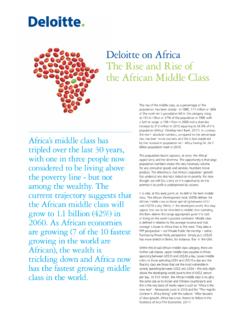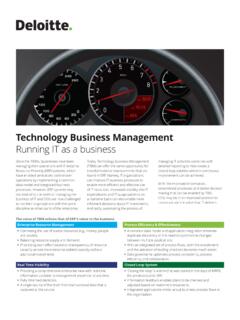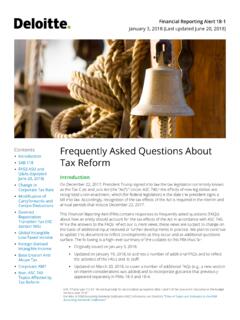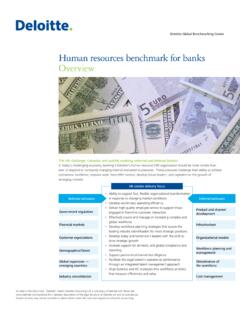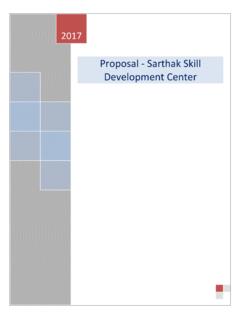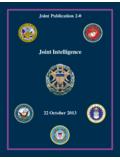Transcription of Getting serious about intercompany accounting - Deloitte
1 Putting intercompany accounting on the straight and narrow Why ignoring the problem is increasing corporate riskPutting intercompany accounting on the straight and narrow Why ignoring the problem is increasing corporate riskIn recent years we ve begun to see more and more companies run into serious difficulties due to a failure to address intercompany accounting issues. It's a problem that many organizations have downplayed, oversimplified, or even ignored. But turning a blind eye can have significant consequences, including hefty fines, financial restatements, and even lawsuits. A number of trends are converging to make intercompany accounting an even bigger issue for finance executives. Companies are becoming increasingly complex and global in nature. Many have multinational value chains that generate a high volume of intercompany transactions sometimes dwarfing their external sales many times over.
2 At the same time, greater regulatory scrutiny and a rise in enforcement are exposing companies to more risk. This publication discusses both a holistic and a proactive approach in which the primary stakeholders accounting , tax, and treasury work together to streamline processes ranging from governance to data management to reporting. To be effective they will need a common vision and a framework for Getting all the pieces moving in tandem. Now is the time for companies to re-evaluate their intercompany accounting doing so will result in streamlined processes, less redundancy, and collaborative working relationships. Such a shift will position them to focus resources on improving performance and fostering growth. Leaders who recognize the opportunity for risk to power performance will go beyond protecting value to creating value.
3 Deloitte s Risk Advisory professionals around the world can help you explore ways to not only address this growing risk, but to power your performance as well. To learn more, please visit us at , Sam BalajiGlobal Risk Advisory Business LeaderRisk powers performanceGetting serious about intercompany accounting Putting intercompany accounting on the straight and narrow Why ignoring the problem is increasing corporate risk1 intercompany accounting (ICA) refers to the processing and accounting for internal financial activities and events that impact multiple legal entities within a company. ICA can include sales of products and services, fee sharing, cost allocations, royalties, and financing activities. It s a broad area that, while rooted in accounting , has extensions into various functions, including tax, treasury, and is intercompany accounting ?
4 A manufacturing company faces a criminal inquiry involving intercompany cash transfers related to its tax insurance company is forced to restate financial results stemming from its failure to eliminate certain intercompany transactions related to variable-interest company s weak internal controls over its related-party transactions allows insiders to fraudulently overstate inventory, leading not only to regulatory fines and restrictions, but to two oil company s improper intercompany accounting results in a restatement of its financial statements and a subsequent lawsuit accusing it of misleading investors about the effectiveness of its internal intercompany accounting on the straight and narrow Why ignoring the problem is increasing corporate risk2 Has your organization been turning a blind eye to intercompany accounting ?
5 The trend is an unsettling one. More and more companies are running into serious problems that have real financial costs as a result of improper or insufficient ICA practices. The reasons range from increased industry consolidation to growing globalization and integrated supply chains. But, in part, the problems are a product of continued denial and neglect. For years, ICA has been downplayed and oversimplified by an everything nets out mentality and the issue is simply forgotten. Yet as the consequences intensify, companies are realizing it s time to straighten things the root of the problemToday s organizations are far more complex than they were a mere decade or so ago. Many have significantly expanded their global footprints, building multinational value chains that generate an enormous volume of intercompany transactions.
6 Operating in multiple countries introduces the need for compliance with country-specific regulations and tax policies. This is especially important given the growing level of regulatory scrutiny from national bodies, particularly in the area of cross-border transactions of has been further complicated by industry consolidation, where stronger players snap up their weaker competitors, often inheriting heterogeneous financial systems, charts of accounts, and accounting processes with each new acquisition. Moreover, as companies grow, they frequently introduce centralized business service centers, which increase the number of intercompany transactions processed. Today, intercompany transactions for large multinational corporations can dwarf their external sales, sometimes many times over.
7 Companies also face a host of other pressures that have them scrambling to find better ways to address this escalating problem. The global proliferation of accounting and tax regulations has been accompanied by a rise in enforcement, exposing companies to greater risk if theyfail to streamline their intercompany transactions. They are also under the gun to achieve a more efficient financial close in order to support filing deadlines and internal control short, the challenges of performing effective and efficient ICA are substantial. Companies grappling with myriad incompatible financial systems and inconsistent processes are often forced to use detective, after the fact methods to try to catch the errors. These quick-fix tactics only postpone the inevitable and the problem keeps growing.
8 Leading companies are evolving their approach and taking a preventive stance in which the primary stakeholders accounting , tax and treasury work hand in hand to create an ICA framework that is streamlined, from governance to function is an islandTaking a collaborative approach is step one in cleaning up the ICA missteps of the past. The effects of improper ICA extend beyond the accounting function, a fact that may not be fully appreciated in many organizations. For example, a company may succeed at eliminating intercompany accounts receivable and accounts payable transactions from their books (within a specific tolerance threshold), thus achieving an important financial reporting goal. Yet at the legal-entity level, exceptions and misclassifications may still remain with certain tax implications.
9 If addressing a particular issue for the accounting department has negative repercussions for the tax department, the ICA problem is just Getting redistributed, but not actually major functions impacted by ICA: accounting : The accounting function is focused on financial accounting and reporting. The primary risk of improper ICA for accounting is financial misstatements, which can impact the company s reputation, stock price, and shareholder value. Visibility and traceability of ICA transactions are key problem areas, particularly when intercompany settlements are via email exchanges with spreadsheet attachments. When taking into account the volume of transactions and the requisite audit trails, the risks of non-compliance with regulatory bodies grows with each transaction. Furthermore, weaknesses in internal controls may surface during an audit, since regulatory bodies, such as the Public Company accounting Oversight Board, have been revising and tightening relevant standards covering related-party transaction and the audit requirements for related parties.
10 Finally, insufficient ICA transparency and control provide the opportunity for misappropriation of assets, allowing unscrupulous professionals to hideassets flowing out of the organization to fictitious vendors or intercompany accounting on the straight and narrow Why ignoring the problem is increasing corporate risk3 Tax : The tax function focuses on the financial positions of individual legal entities. Transactions between countries are subject to specific tax laws and transfer pricing requirements. Misclassified profits between countries can result in tax penalties, interest, and reputational damage. Tax organizations of large multinationals have been particularly impacted by the requirements of the Base Erosion and Profit Shifting (BEPS) project, developed by the Organisation for Economic Co-operation and Development and the G20.



